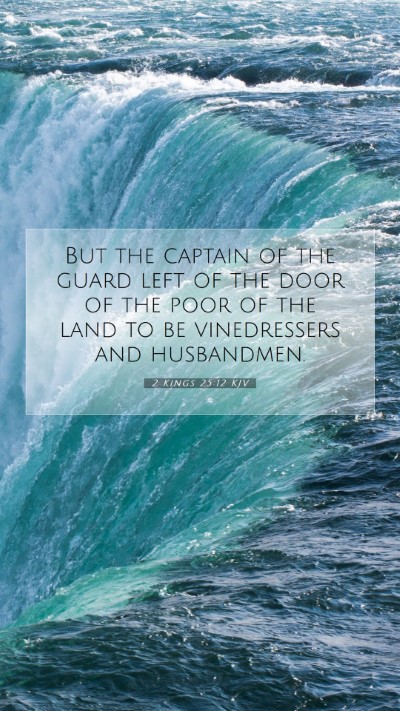Bible Verse Explanation and Commentary on 2 Kings 25:12
2 Kings 25:12 reads: “But the captain of the guard left some of the poor of the land to be vinedressers and husbandmen.” This verse can often prompt questions regarding its implications and meanings within a biblical context.
Understanding the Context
This verse occurs in the narrative detailing the fall of Jerusalem, signifying a catastrophic moment in the history of Israel. The Babylonians, under King Nebuchadnezzar, have besieged and conquered the city, leading to the destruction of the temple and the exile of the Jewish people. The act of leaving the poor behind, however, hints at God’s mercy amid destruction.
Biblical Commentary Insights
-
Matthew Henry’s Commentary:
Henry highlights that the captain of the guard's decision to leave the poor indicates the Babylonian policy of accumulation and agricultural productivity. The poor, often those left behind in such calamities, become key to maintaining the land's productivity. This act shows some form of preservation that could pave the way for future restoration.
-
Albert Barnes’ Notes:
Barnes interprets this verse as a sign of practical management by the Babylonian authorities, who, rather than completely destroying every aspect of the conquered territory, sought to employ those remaining and cultivate the land. This detail reflects a nuanced approach to governance that contrasts with complete annihilation.
-
Adam Clarke’s Commentary:
Clarke emphasizes the mercy exhibited through the Babylonian captain’s decision. He notes that the preservation of the poor may allude to God's providence—indicating that even in dire circumstances, God ensures that there remains a remnant of His people to fulfill His promises. The agricultural work could symbolize hope for future restoration and the continuity of life.
Significance of 2 Kings 25:12
This verse is pivotal as it reflects the broader themes of God’s providence, grace, and the socio-political dynamics of the time. Understanding its implications can provide valuable insights into God’s plan amid human despair.
Historical Context
The historical backdrop of this verse is crucial for understanding its significance. During this time, Jerusalem had been a focal point for Jewish worship and national identity. The disaster marked a significant shift, and yet, remnants of life continued, mirroring God’s promise to His people.
Application to Daily Life
For modern readers, 2 Kings 25:12 can serve as a reminder that even in our lowest moments, there can be purpose and hope. The notion of leaving behind those to cultivate the land emphasizes God's continued presence among His people. The verse encourages us to look for signs of life and hope in adverse situations.
Related Bible Verses
- Jeremiah 39:10 - Similar accounts of the aftermath of Jerusalem’s fall.
- Isaiah 40:1-2 - God’s comfort for His people following judgment.
- Ezekiel 36:8 - God’s promise of restoration to the land.
Conclusion
2 Kings 25:12, while a simple observation about historical events, is rich with theological implications and practical lessons. Understanding this verse through various biblical commentaries illuminates its meaning and encourages deeper Bible study insights. As believers, we are called to reflect on God's continues mercy, even in trials.
In conclusion, the explanations provided by respected public domain commentaries help in grasping the nuances of this verse, making it a valuable study topic for individuals or Bible study groups. Engaging in discussions about this verse can deepen our understanding of Scripture and prepare us for life's challenges.


